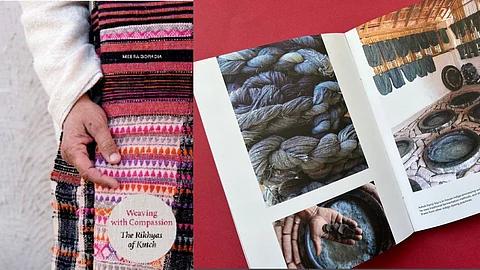
- HOMEGROWN WORLD
- #HGCREATORS
- #HGEXPLORE
- #HGVOICES
- #HGSHOP
- CAREERS
- ABOUT US
- CONTACT US

Weaving With Compassion is a book woven from the lives, struggles, and triumphs of the Meghwal community of Kutch. Authored by Meera Goradia and visually narrated by Ragini Siruguri, the book delves into the heart of this community, where the art of weaving is closely intertwined with cultural identity, spiritual beliefs, and the very fabric of their lives.
The book opens with a powerful quote by Shamji Vishram, a master weaver, emphasizing that the weaver's workshop is as much about the people who weave as it is about the place itself. This sentiment forms the cornerstone of Weaving With Compassion. Goradia, with her deep understanding of the Meghwals gained through decades of working with artisans, goes beyond showcasing beautiful textiles. She shines a light on the human stories behind them.
The book is a treasure trove of first-person narratives from the weavers themselves. These excerpts offer a window into their perspectives on their craft, their histories, and the significance of weaving in their lives. We hear from Champa Siju Mangaria, a weaver-artist who carves her own path by blending tradition with contemporary abstract art. Her story exemplifies the empowerment weaving brings to women; allowing them not only to contribute financially but also to express their unique creativity.
Weaving with Compassion also acknowledges the historical and cultural context that shaped the Meghwal community's weaving practices. Goradia delves into a period of discrimination and marginalization, highlighting the grit and resilience that have become embedded in their collective psyche. This very struggle, the book suggests, has fueled their innovation and entrepreneurial spirit.
The book also explores the deep connection between the Meghwals' spirituality and their weaving. Faith and tradition are not merely abstract concepts, they are embedded into the very threads of their craft. V. Geetha, Editorial Director of Tara Books, the publishers, highlights this unique aspect, stating that the book brings into focus the role of spiritual beliefs in sustaining not just the craft but also the community spirit.
Ragini Siruguri's visual narrative plays a crucial role in bringing the world of the Meghwal weavers to life. Her photographs capture the core essence of the craft, the dedication of the artisans, and the beauty of the woven textiles. Siruguri's thoughtful composition and use of visual metaphors create an aesthetic language that complements Goradia's written narrative.
Weaving With Compassion aspires to mirror the collective spirit of the Meghwal community. Just like Goradia acknowledges, the creativity and cultural richness of this community cannot be fully captured. However, through her work, she strives to create space for their voices to be heard, their struggles acknowledged, and their triumphs celebrated.
The book concludes with excerpts from Meghji Harji, a master weaver from Kotay. His story exemplifies the cyclical nature of the weaving industry, and the way he faces challenges from changing market demands and competition. Yet, Harji's narrative also reflects the adaptability and resilience of the Meghwals. He speaks of embracing new materials like Kala cotton and expresses the hope it brings them a renewed future.
Weaving With Compassion is a book that deserves a place on the shelves of anyone interested in textiles, handicrafts, or the human stories behind the things we use every day.
You can buy Weaving With Compassion here.
If you enjoyed reading this, here's more from Homegrown:
Anuvad Studio's Interactive E-Textiles Are Intersecting Craft & Tech
Calling All Textile Artists: Join The Himalayan Knot Residency In Ladakh
Label AKHL's Unique Approach To Textiles Is A Masterclass In Experimental Design
